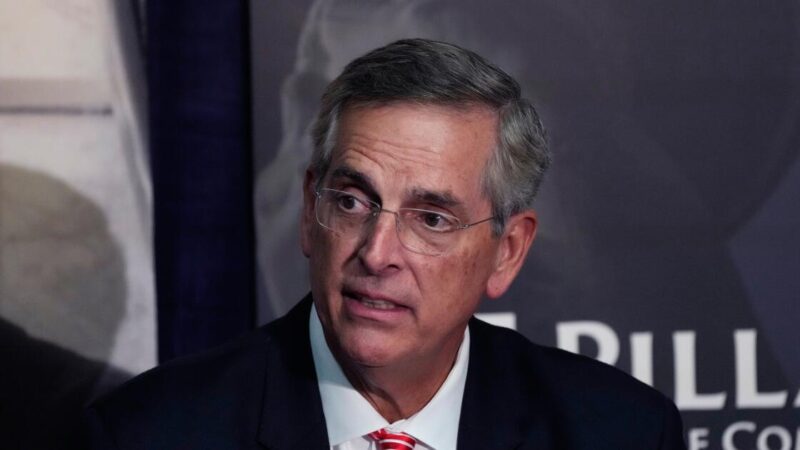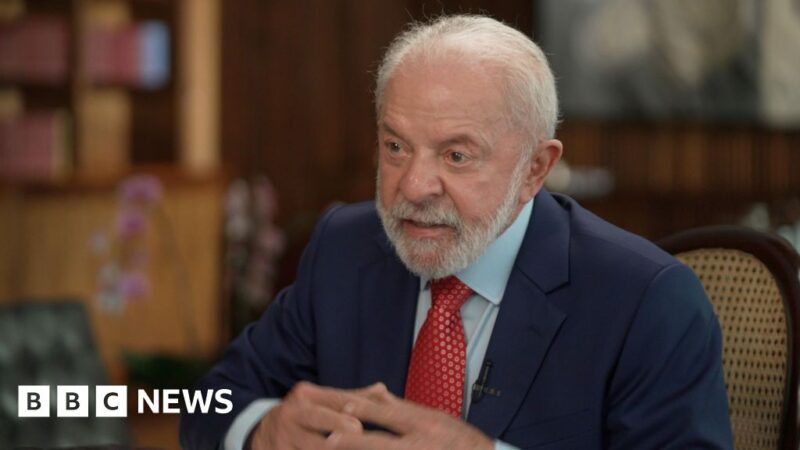How a fictitious Hollywood diva helped forge Trump’s personality
A week after Joe Biden clinched the 2020 presidential election, Maureen Dowd published a New York Times piece that compared the delusional thinking of outgoing President Trump, who refused to accept defeat, to Norma Desmond descending her staircase in the final scene of “Sunset Boulevard.” Dowd noted that Trump had frequently identified “Sunset Boulevard” as his favorite film. Released 75 years ago this month, Billy Wilder’s caustic Hollywood satire features a fictitious diva of the silent film era who deludes herself into believing she can make a glorious return to the silver screen. The film cautions against delusional thinking, which, left unchecked, as in Norma’s case, results in mayhem and madness.
Former Trump White House Press Secretary Stephanie Grisham, now repudiated by him, recalled how thrilled the then-first-term president was to introduce the film to her in a private screening at Camp David: “I must admit, I loved it and was shocked at all of the similarities between President Trump and Norma Desmond.” Grisham was surprised by Trump’s naive interpretation of the film as a rousing comeback story: “Here was a woman who was convinced that everyone loved her and lived in a fantasy world of her own making. I’m sure that Trump had no clue — like none — how similar to him she was.”
In 2022, business writer Timothy O’Brien recalled watching “Sunset Boulevard” with Trump on his jet some 20 years earlier. There’s an electrifying scene in which Norma, during a private screening of one of her past films, leaps to her feet. Caught in the harsh light of the projector, she bemoans her loss of stature, which she blames on the Hollywood establishment: “Those idiot producers. Those imbeciles! Haven’t they got any eyes? Have they forgotten what a star looks like? I’ll show them. I’ll be up there again, so help me.”
O’Brien recalled Trump leaning over to whisper, “Is this an incredible scene or what?” With Trump aiming for a “comeback” of his own, wrote O’Brien in 2022, he “plans to show any doubters what he’s made of. He’ll be up there in the White House again, so help him.”
Norma Desmond’s story ends tragically; she murders her young lover in a fit of jealousy and goes mad in front of news cameras that, in her mental fog, she mistakes for movie cameras: “All right, Mr. DeMille, I’m ready for my close-up.” Her dream is realized only in her head. Trump, to the contrary, proved his doubters wrong by returning to the White House, so help him.
But then, making it to the White House doesn’t necessarily prove the occupant to be free of delusional thinking. President Biden, we’ve recently learned, didn’t always have a clear grasp of the facts of his political situation, thanks in part to wishful thinking of his own and that of his inner circle, who at times shielded the president from negative polling data while they determined “how to frame it.” If Biden was delusional — believing he stood a much better chance against his rival than facts warranted — so were his supporters, convincing themselves he could run again and win.
Rank-and-file Democrats similarly believed what they wanted to about the sitting president, ignoring evidence of his diminished mental capacity, blaming the apparent signs of decline on biased reporting on the right. Here was a case of one delusional fantasy trumping (excuse me) another.
In “Sunset Boulevard,” one of the big reveals comes when we learn that the many fan letters Norma Desmond receives each day are not in truth penned by devoted admirers, who had long ago deserted her, but instead by her servant, Max, who dutifully sends them under pseudonyms to keep his employer from learning she’s not only past her prime but also long forgotten. Max carefully curates information, making certain she reads exactly what he knows she will want to read; he is an old-fashioned, one-man version of today’s algorithmic news filters that ensure we hear only what we want to hear. If presidents in the White House are subject to confirmation bias, so are we.
“Sunset Boulevard” is not the only classic movie from Hollywood’s Golden Age that Trump has identified among his favorite films. He’s said the same about “Citizen Kane,” a pseudo biopic of newspaper magnate William Randolph Hearst directed by Orson Welles in 1941. Welles’ movie invents an early 20th century populist, who, though raised with a silver spoon in his mouth, vows to dedicate his life to the fight against big money and political corruption, not realizing that he increasingly comes to epitomize big money and political corruption; he is in fact the very enemy he tells his devoted followers he will scourge.
Despite his professed love for the common man, Kane is a hopeless narcissist, incapable of loving anyone other than himself. As his disillusioned former best friend has the courage to tell him to his face: “You don’t care about anything except you. You just want to persuade people that you love them so much that they ought to love you back.”
When Kane, enmeshed in a sex scandal, loses a hotly contested gubernatorial race, his newspaper editors go with the front page they had composed ahead of time, just in case he lost: “FRAUD AT THE POLLS,” the headline shouts. Sound familiar?
It takes an army of true believers or, if you will, self-deluders to support the master narcissist’s quest for unconditional love. Not only the inner-circle advisors but also the millions of voters in either political camp who believe only what they want to believe, even when it defies reality. In this regard, we too are subject to narcissistic behavior, inasmuch as narcissists brook no challenge to their sense of reality; they are immune to external correction.
In the 1979 bestseller “The Culture of Narcissism,” Christopher Lasch argued that the relentlessly me-centered nature of consumer society resulted in America becoming a nation of narcissists. He pointed to an endemically fragile sense of self that led to a dread of aging, obsession with fame and celebrity and a constant need to be liked. This analysis seems even more apt today, in the age of social media. Symbolically the road where narcissism meets self-delusion, Hollywood’s Sunset Boulevard now stretches all the way across the country to culminate in Pennsylvania Avenue. The unchecked narcissism of the man in the White House seems to mirror that of the electorate at large, including those of us who did not vote for him.
Apparently, Trump sees something of himself in Norma Desmond. If we look hard, we can see ourselves in her as well.
David M. Lubin is the author of ”Ready for My Close-Up: The Making of ‘Sunset Boulevard’ and the Dark Side of the Hollywood Dream.”





